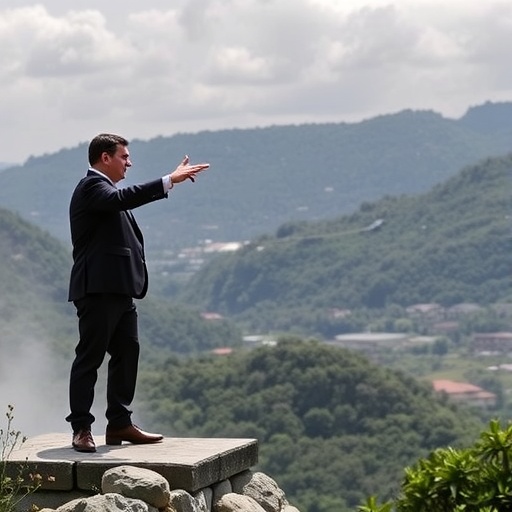Colombia and Mexico Demand U.S. Halt Military Strikes Near Venezuela to Preserve Regional Diplomacy
In a bold and unified stand against escalating tensions, leaders from Colombia and Mexico have issued a joint plea to the United States, urging an immediate cessation of military actions near Venezuela’s borders. This unprecedented call, delivered during a high-level virtual summit on Thursday, highlights growing fears that U.S. military operations could unravel fragile diplomatic ties across Latin America, potentially sparking a broader regional crisis.
The statement comes amid reports of intensified U.S. military patrols and drone surveillance in the Caribbean, ostensibly aimed at countering drug trafficking and supporting anti-regime forces in Venezuela. However, Colombian President Gustavo Petro and Mexican President Claudia Sheinbaum warned that such maneuvers risk destabilizing cooperation on critical issues like migration, trade, and environmental protection. “We cannot allow military posturing to eclipse the path of dialogue,” Petro declared, emphasizing the need for renewed diplomacy in the region.
This development marks a significant shift in hemispheric relations, as two key U.S. allies in Latin America publicly challenge Washington’s approach. With Venezuela’s ongoing political turmoil under President Nicolás Maduro, the intervention by Colombia and Mexico underscores the delicate balance of power in South America.
Colombian Leader’s Fiery Critique of U.S. Military Encroachment
Colombian President Gustavo Petro, known for his progressive stance on regional issues, led the charge with a pointed address from Bogotá. Speaking to a gathering of Latin American diplomats, Petro lambasted the U.S. military presence as “a relic of outdated interventionism that threatens our sovereignty.” He specifically referenced recent U.S. Navy exercises off the Venezuelan coast, which involved over 5,000 personnel and multiple warships, according to Pentagon disclosures.
Petro’s remarks were not made in isolation. Colombia, sharing a 1,400-mile border with Venezuela, has long been a frontline state in the migration crisis sparked by Venezuela’s economic collapse. Over 2.5 million Venezuelan refugees have crossed into Colombia since 2015, straining resources and fueling social tensions. Petro argued that military actions only exacerbate these flows, potentially leading to increased violence along the border. “Diplomacy must prevail,” he insisted, calling for the reactivation of the Lima Group, a multilateral forum disbanded in 2022 but now eyed for revival.
Supporting data from the United Nations Refugee Agency (UNHCR) bolsters Petro’s concerns. In 2023 alone, border incidents involving Venezuelan state forces and Colombian patrols rose by 30%, with U.S.-backed surveillance contributing to heightened alertness. Petro proposed a trilateral summit involving Colombia, Venezuela, and the U.S. to address these issues, a move that could redefine Colombia‘s role as a mediator rather than a proxy in U.S. strategies.
Mexico’s Strategic Pivot Toward Non-Interventionist Diplomacy
Joining Petro in solidarity, Mexican President Claudia Sheinbaum echoed the call for de-escalation, framing Mexico’s position as a defense of the Monroe Doctrine’s original spirit—non-interference in hemispheric affairs. From Mexico City, Sheinbaum stated, “Our nations have suffered enough from external meddling; it’s time for the U.S. to step back and let diplomacy lead.” Her words carry weight given Mexico’s economic ties to both the U.S. and Venezuela, including a $1.2 billion trade volume in oil and goods last year.
Sheinbaum’s administration has been navigating its own complexities with Venezuela. Mexico has historically provided asylum to Venezuelan opposition figures while maintaining diplomatic channels with Maduro’s government. Recent U.S. sanctions on Venezuelan oil exports have indirectly pressured Mexican refineries, which process up to 200,000 barrels daily from Venezuela. By urging a halt to U.S. military strikes—referring to precision airstrikes reported in early 2024 targeting suspected cartel routes near Venezuelan waters—Sheinbaum aims to safeguard these economic lifelines.
Analysts note that Mexico’s intervention signals a broader realignment. A 2023 poll by the Mexican Council on International Relations revealed 68% of respondents favor stronger Latin American unity against U.S. unilateralism. Sheinbaum’s push aligns with her party’s doctrine of “republican austerity,” prioritizing multilateralism. She outlined potential next steps, including proposing a UN Security Council resolution to monitor military activities in the Caribbean, a bold escalation that could isolate the U.S. if supported by other nations like Brazil and Argentina.
Warnings of Destabilization Echo Through Latin American Alliances
The joint communiqué from Colombia and Mexico warns that continued U.S. military operations could “shatter the foundations of regional cooperation.” This is no idle threat. The Pacific Alliance, a trade bloc including Mexico and Colombia, has seen intra-regional trade grow by 15% annually since 2020, reaching $250 billion in 2023. Disruptions near Venezuela could ripple through supply chains, affecting everything from agricultural exports to energy security.
Experts like Dr. Elena Vargas, a Latin American studies professor at the University of Bogotá, highlight the stakes. “Venezuela’s instability already costs the region $10 billion yearly in lost productivity and aid,” she told reporters. “U.S. actions risk turning a humanitarian issue into a security quagmire.” Vargas pointed to historical precedents, such as the 2019 U.S.-backed coup attempt in Venezuela, which led to sanctions that halved the country’s GDP and spurred mass emigration.
Quotes from regional leaders amplify the urgency. Brazilian President Luiz Inácio Lula da Silva, though not a signatory, expressed support via Twitter: “Peace in Venezuela is peace for all of us—military solutions only breed chaos.” Similarly, the Community of Latin American and Caribbean States (CELAC) issued a statement endorsing the call for diplomacy, with 33 member nations urging the U.S. to engage in the Norwegian-led talks that stalled in 2022.
Statistics underscore the fragility: The World Bank reports that Latin America’s GDP growth could dip by 2% if border conflicts escalate, impacting 650 million people. Colombia and Mexico’s stance positions them as vanguards of a “new diplomacy,” potentially influencing U.S. policy ahead of the 2024 elections.
Historical Tensions Fuel Current Diplomatic Pushback
To understand the depth of this appeal, one must revisit the fraught history of U.S. involvement in Venezuela. Since the early 2000s, Washington has viewed Caracas as a geopolitical adversary, imposing over 300 sanctions since 2017 that have crippled Venezuela’s economy. The U.S. military’s role has evolved from covert support for opposition groups to overt operations, including the 2020 deployment of naval assets during disputed elections.
Colombia, under previous administrations, was a staunch U.S. partner, hosting American troops for anti-drug operations. However, Petro’s 2022 election shifted gears, with Bogotá now criticizing what it calls “imperial overreach.” Mexico, post its 2018 leadership change, has adopted a more autonomous foreign policy, abstaining from U.S.-led condemnations of Maduro at the OAS.
This backdrop informs the current urgency. A leaked State Department memo, cited by The New York Times, reveals internal debates over scaling back operations amid allied pushback. “The cost of isolation in Latin America is too high,” the memo notes, hinting at possible concessions like joint diplomatic envoys.
Further context comes from on-the-ground reports. In Cucuta, Colombia’s border city, local officials report a 25% spike in refugee arrivals following recent U.S. flyovers, which locals perceive as provocative. Venezuelan Foreign Minister Yván Gil responded positively to the Colombia-Mexico initiative, stating, “True neighbors choose words over weapons.” This rare alignment could pave the way for confidence-building measures, such as demilitarized zones along the Orinoco River.
Prospects for Renewed Talks and Regional Stability
Looking ahead, the calls from Colombia and Mexico open doors to multifaceted diplomatic efforts. The U.S. State Department has acknowledged the concerns, with spokesperson Matthew Miller saying, “We remain committed to peaceful resolutions in Venezuela.” Yet, specifics remain vague, fueling speculation about upcoming negotiations.
Potential pathways include reviving the Mexico-Norway mediated dialogues, which in 2021 yielded temporary oil export easements. Experts predict that incorporating Brazil and Canada could broaden the table, addressing not just politics but humanitarian aid—vital as Venezuela faces a 2024 cholera outbreak affecting 10,000 cases.
Economically, de-escalation could unlock opportunities. The U.S.-Mexico-Canada Agreement (USMCA) ties into broader hemispheric trade, and stabilizing Venezuela might boost oil prices, benefiting all parties. Think tanks like the Council of the Americas forecast a 5% regional growth uptick if tensions ease.
Challenges persist: Hardliners in Washington argue military pressure is necessary against Maduro’s alliances with Russia and Iran. However, the momentum from Colombia and Mexico suggests a tipping point. As Sheinbaum prepares for a CELAC summit in October, the region braces for either renewed diplomacy or deepened divides. The coming weeks will test whether words can indeed halt the drums of war near Venezuela‘s shores.
In the interim, civil society groups in both countries are mobilizing. A coalition of NGOs, including Amnesty International’s Latin American branch, has launched a petition garnering 500,000 signatures urging global support for the diplomatic pivot. This grassroots energy, combined with governmental resolve, positions Latin America at a crossroads— one that could redefine U.S.-regional relations for decades.
Monitoring bodies like the Organization of American States (OAS) are set to convene an emergency session next month, where resolutions on military restraint could be tabled. If adopted, this would mark a historic check on unilateral actions, reinforcing the principle that security in the Americas is a shared endeavor.








